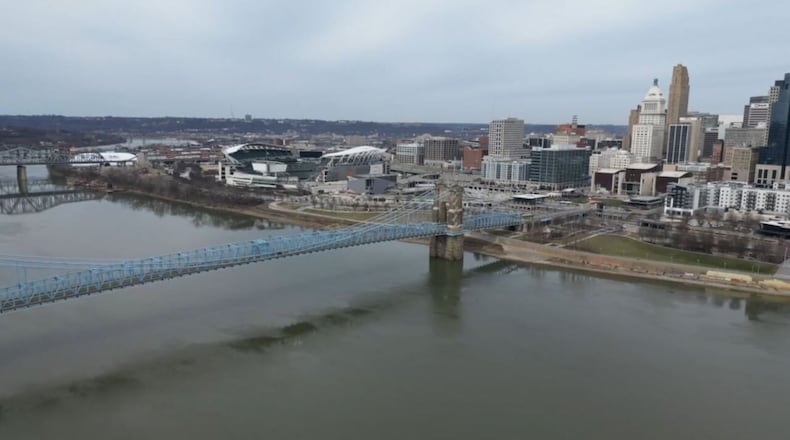Greater Cincinnati Water Works supplies water to Butler County and some portions of Warren County.
During an update on Friday, shortly after GCWW announced their intention to close the intakes, Governor Mike DeWine said the chemical plume in the Ohio River has completely dissipated, citing latest samples.
As of Friday, GCWW and the Ohio EPA said it still hadn’t yet detected chemicals in the Ohio River, so the intakes remained open.
The contaminated waters containing the chemicals from the Feb. 3 derailment were moving at a rate of roughly one mile per hour, Ohio EPA Chief Tiffani Kavalec said Tuesday.
“Our city administration is prepared for these types of events,” said City Manager Sheryl Long, in a press release. “I understand the concern, and I’m confident that temporarily shutting off the Ohio River intake is the best move. There’s zero risk that our water reserves contain contaminants from the train derailment site, and tapping these reserves will give us all peace of mind. I want to thank GCWW, who are truly the best of the best, and state that I have full faith in their decision-making and their ability to keep us safe.”
The current water reserves hold water collected before the contamination from the East Palestine train derailment reached the Ohio River and are safe to drink, GCWW said. The agency said it will continue to monitor the Ohio River to determine when it’s safe to reopen the intakes once more.
Even if no chemicals are detected, GCWW said it plans to use “additional optimized treatment” once the intakes reopen.
GCWW has, as of Friday morning, tested more than 130 samples at the Ohio River intake that draws in Cincinnati’s drinking water and no detectable levels of the chemicals from the Norfolk Southern train have been found, according to a press release from the agency.
“We do this kind of testing every day, several times a day,” said Jeff Swertfeger, superintendent of water quality and treatment at GCWW.
The Northern Kentucky Water District announced on Feb. 10 that it also intends to shut down Ohio River intakes as “a precautionary measure” if chemicals from the train derailment continued downstream. WCPO has reached out to NKWD to ask whether any recent decisions have been made about the intakes since then, but have not yet heard back.
On Feb. 10, the U.S. EPA issued a letter to Norfolk Southern, the company that owns the derailed train, notifying it that the agency believed the company could be found liable for damages and cleanup associated with the incident. In that letter, the EPA said 150 cars on the train derailed — 20 of which were carrying hazardous materials.
The materials “are known to have been and continue to be released into the air, surface soils and surface waters,” the EPA wrote on January 10.
Those materials are:
- Vinyl chloride
- Butyl acrylate
- Ethylhexyl acrylate
- Ethylene glycol monobutyl ether
- Isobutylene
“Materials released during the incident were observed and detected in samples from Sulphur Run, Leslie Run, Bull Creek, North Fork Little Beaver Creek, Little Beaver Creek and the Ohio River,” wrote the EPA in the letter to Norfolk Southern.
On Feb. 13, the EPA said it was monitoring and screening air quality in communities in and around East Palestine. Re-entry air screenings showed that there were no detections of vinyl chloride or hydrogen chloride in the 291 homes screened as of the update, including local schools and libraries.
State officials had no idea the train that derailed carried hazardous chemicals before it crashed, Governor Mike DeWine said during a press conference Tuesday afternoon. He said under current law, Norfolk Southern wasn’t required to notify states when trains are transporting hazardous chemicals if the cars carrying such substances don’t make up enough cars in the train.
“This is absurd and we need to look at this and Congress needs to take a look at how these things are handled,” said DeWine.
About the Author
